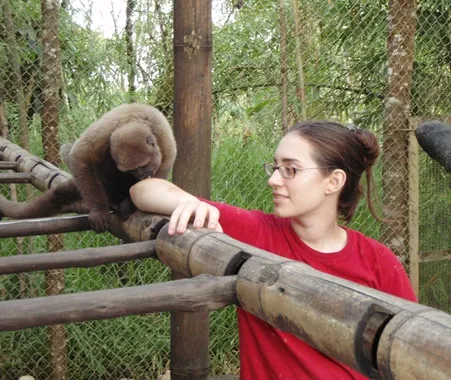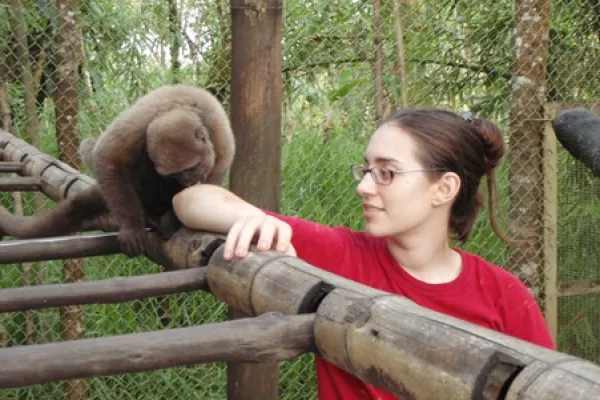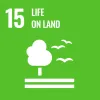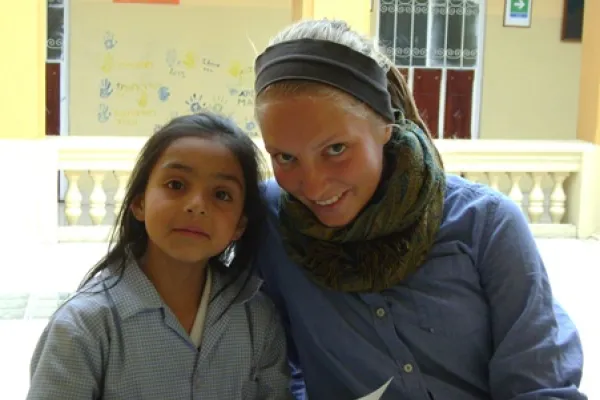Overview
Este projeto está localizado na floresta tropical equatoriana e trabalha para resgatar, reabilitar e, quando possível, soltar animais de volta ao seu ambiente natural.
O centro trabalha em parceria com a Polícia Ambiental Equatoriana (UPMA) e o Ministério do Meio Ambiente na luta contra o tráfico, abuso, captura e caça de animais selvagens. Este centro é muito organizado e os voluntários podem ajudar a cuidar dos animais e na manutenção.
Este projeto foi fundado em 2006 com o objetivo de proteger a vida selvagem da região amazônica por meio do resgate e reabilitação da flora e fauna locais. Os animais do centro foram todos abusados, negligenciados ou abandonados. Alguns dos animais ficaram órfãos quando seus pais foram mortos por caçadores, outros foram resgatados de traficantes de animais que estavam tentando traficar os animais para fora do país e muitos foram recuperados de famílias que mantinham esses animais em cativeiro. Infelizmente, a maioria sofreu algum tipo de abuso físico ou psicológico.
Atualmente, há pelo menos 40 espécies diferentes de animais no centro, incluindo: jaguatiricas, iraras, capivaras, papagaios, macacos, tartarugas e jacarés, entre outros.
O centro também está aberto para turistas visitarem, cobrando uma pequena taxa de entrada que é a única outra fonte de renda do centro. Como o bem-estar animal não é uma alta prioridade para muitos equatorianos, o histórico e os maus-tratos de cada animal são explicados aos turistas, com a ideia de educar visitantes locais e estrangeiros sobre questões de proteção animal. Em geral, as visitas não são guiadas, mas os turistas podem ler sobre cada animal na placa de informações nas gaiolas.
Cronograma de trabalho voluntário
Cronograma de trabalho voluntário
No seu primeiro dia, você participará de uma reunião de orientação onde revisaremos as atividades planejadas para os próximos dias. Esta também será uma oportunidade para discutir suas expectativas e explorar seus talentos e interesses, garantindo que sua experiência de voluntariado seja impactante para o projeto e pessoalmente gratificante.
Após a orientação, você mergulhará em suas tarefas. Tenha em mente que cada dia será diferente, com suas responsabilidades variando com base nas necessidades diárias do projeto. Valorizamos sua flexibilidade e disposição para ajudar onde for necessário. O almoço é fornecido no local do projeto de segunda a sexta-feira, dando a você um intervalo ao meio-dia. Depois, você continuará seu trabalho até por volta das 17h.
O restante do seu dia é livre para você aproveitar. Sua agenda semanal geralmente seguirá o mesmo padrão, com horário de trabalho das 8h às 17h, de segunda a sexta. O coordenador o guiará para onde você for mais necessário, e também encorajamos quaisquer ideias que você possa ter!
A cada dois fins de semana, seja sábado ou domingo, voluntários trabalharão algumas horas pela manhã para ajudar a alimentar os animais. O resto do fim de semana é livre para você explorar ou relaxar.
Funções e responsabilidades dos voluntários
Funções e responsabilidades dos voluntários
Cada atividade contribui para o bem-estar dos animais e para o bom funcionamento do centro de resgate de animais. Os voluntários geralmente estão envolvidos nas seguintes tarefas:
Cuidados diários com os animais: Atenda às necessidades diárias dos animais
Preparação da dieta e alimentação: corte frutas, prepare dietas e alimente os animais
Ajude os recém-chegados: ajude os novos animais a se adaptarem ao centro
Manutenção Geral: Cuide das tarefas de manutenção e limpeza do centro
Trabalho de construção: Reparar e construir novos recintos para melhorar as instalações
Atividades de enriquecimento: Melhore as gaiolas e recintos para manter os animais envolvidos
Treinamento: Treine animais que não podem ser soltos para reduzir o estresse, especialmente durante exames médicos
Assistência veterinária: Dê suporte ao veterinário quando necessário
Tarefas adicionais: envolver-se em jardinagem, melhorar trilhas e criar placas para visitantes
Project Requirement
Project Requirement
Os voluntários devem ter 18 anos ou mais no momento da adesão ao projeto. Você precisa ter uma mente aberta e uma atitude flexível para trabalhar em um ambiente novo e diferente. O voluntário deve trazer energia e entusiasmo para fazer a diferença. Os participantes devem estar em forma e saudáveis no momento de ingressar no programa e devem estar preparados para trabalhar ao ar livre e colocar a mão na massa. Os participantes do programa devem ter um grande interesse e amor pelo trabalho de conservação animal. Os participantes não devem ter condenações criminais e devem fornecer um relatório de verificação de antecedentes criminais limpo.
Schedule a Google Meet with a Program Advisor
Interested in our programs? We're here to provide expert guidance
- Get Detailed Info
- 20 min One -on-One meeting
- Get expert advise
- Application Guidance
Photo Gallery
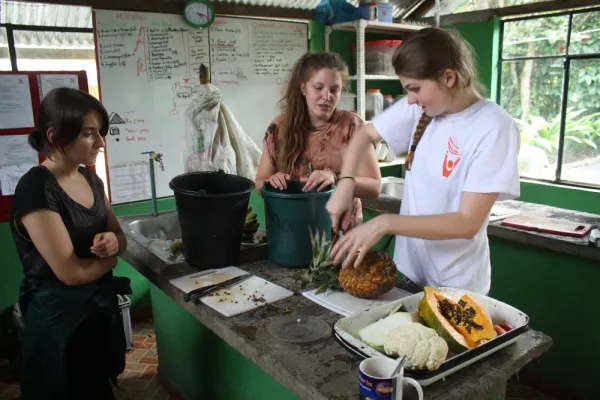
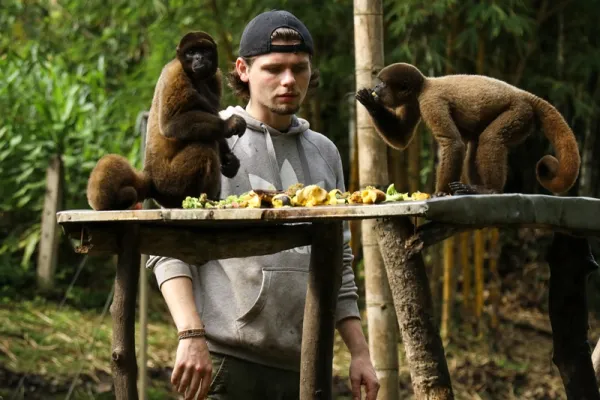
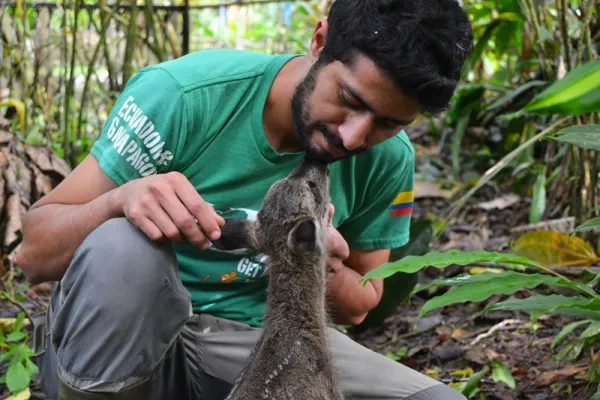
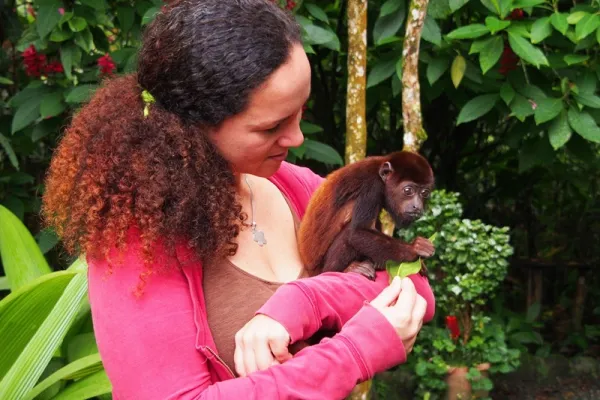
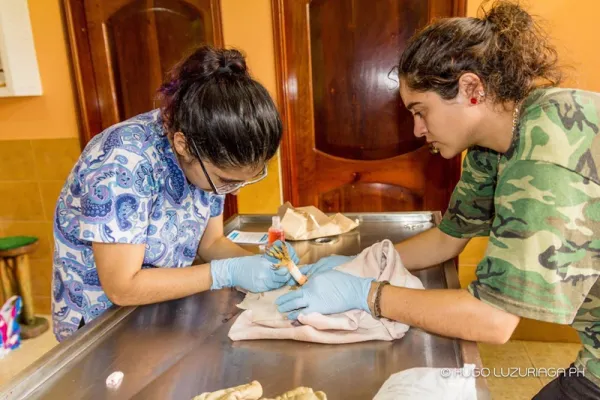
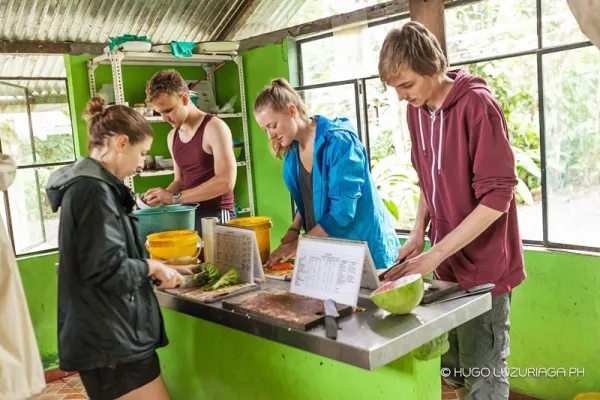
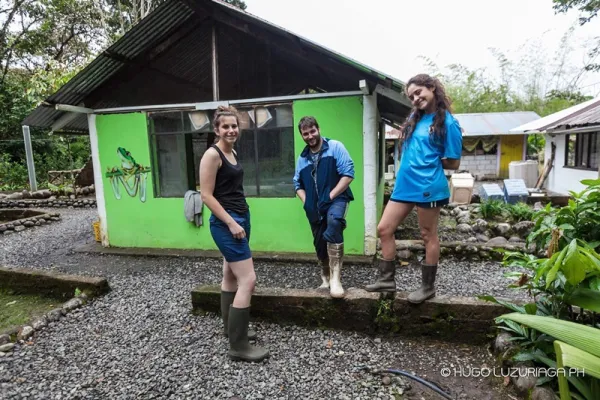
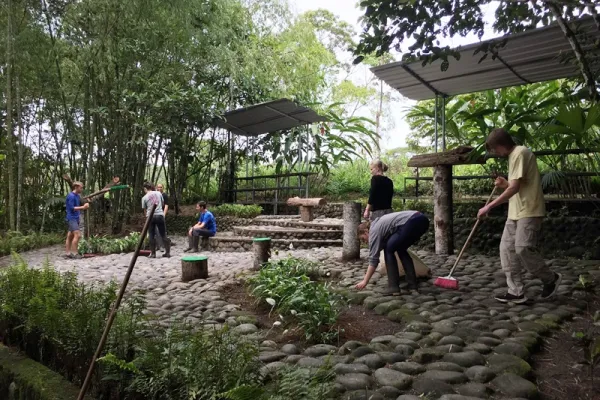
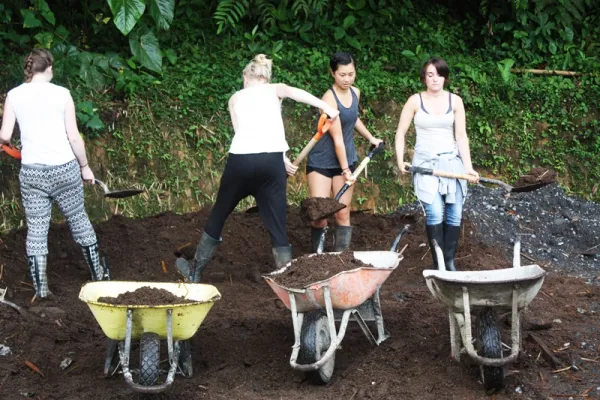


Living
Living
Volunteering Solutions é um nome estabelecido para estágios de voluntariado no exterior. Garantimos que todas as nossas acomodações e padrões de vida correspondam aos requisitos e níveis de conforto de nossos voluntários.
Traslado do Aeroporto
Os voluntários seriam buscados no Aeroporto Internacional Mariscal Sucre pela equipe do VolSol ou pelo coordenador do país. Os voluntários que já estão em Quito podem chegar diretamente na casa do voluntário.
Alojamento
Ao chegar em Quito, os voluntários recebem acomodação para uma noite na casa de voluntários. Após a transferência para o projeto em Puyo, os voluntários são acomodados no local em cabanas compartilhadas. Existem cabanas para voluntários com dormitórios que oferecem espaço para até 14 pessoas no total. Há uma cozinha compartilhada, banheiro e área social com TV e DVD player, redes e livros. Você receberá roupa de cama e ainda terá acesso a piscina e wi-fi.
Orientação
Nossa equipe local fornecerá uma sessão de orientação abrangente para os voluntários. A orientação cobriria informações sobre seu projeto e outras informações essenciais.No local, a equipe do programa apresentará o voluntário ao projeto e à equipe local do projeto e ajudará na introdução básica.
Refeições
Os voluntários recebem três refeições por dia, da manhã de segunda-feira ao almoço de sábado. Fora desses horários, os voluntários podem desfrutar de uma refeição nas proximidades de Puyo ou preparar comida na cozinha comunitária. Espera-se que os voluntários ajudem e contribuam também nas atividades de cozinha e limpeza. Os voluntários também podem fazer viagens à cidade local para comprar alimentos / lanches adicionais.
Durante o seu tempo livre
Enquanto no projeto, durante o tempo livre, os voluntários socializam principalmente com outros voluntários. Wi-Fi também está disponível para voluntários durante seu tempo livre. Nos fins de semana, para ir a Quito ou outros lugares, os voluntários podem pegar um táxi até a rodoviária (“El terminal”) e pegar um ônibus de lá.
Dates
Dates
January
04
11
18
25
February
01
08
15
22
March
01
08
15
22
29
April
05
12
19
26
May
03
10
17
24
31
June
07
14
21
28
July
05
12
19
26
August
02
09
16
23
30
September
06
13
20
27
October
04
11
18
25
November
01
08
15
22
29
December
06
13
20
27
January
03
10
17
24
31
February
07
14
21
28
March
07
14
21
28
April
04
11
18
25
May
02
09
16
23
30
June
06
13
20
27
July
04
11
18
25
August
01
08
15
22
29
September
05
12
19
26
October
03
10
17
24
31
November
07
14
21
28
December
05
12
19
26
Available
Filling Fast
Booked Out
Costs
| Duration |
Program Fee
|
Choose your currency
|
|---|---|---|
| 2 Weeks | $890 | |
| 3 Weeks | $1090 | |
| 4 Weeks | $1300 | |
| 5 Weeks | $1510 | |
| 6 Weeks | $1680 | |
| 7 Weeks | $1910 | |
| 8 Weeks | $2099 | |
| Extra Week | $230 |
Please Note: An application fee of is charged over and above the program fee as an application payment. A 5% international banking fee is charged for credit card payments of program fee in USD/AUD.
Pelo que você esta pagando?
- Traslado do aeroporto de Quito
- Uma noite de hospedagem em um albergue em Quito
- Hospedagem no Projeto em Puyo
- Guia de informações antes da partida
- Orientação
- Suporte à equipe local
- Todas as refeições durante a semana
- Transferência para a estação de ônibus em Quito para viajar para Puyo
O que NÃO está incluído?
- voos
- Traslado de retorno ao aeroporto de Quito
- Transferência de retorno do projeto para Quito
- Refeições aos fins de semana
- Despesas pessoais
- Custo da passagem de ônibus de Quito para Puyo
FAQ's
Health and Safety
-
Do I need to buy health insurance?
-
Yes, for all participants it is mandatory to have a travel medical insurance.Volunteers have the option to purchase Travel and Medical Insurance at a nominal extra cost from Volunteering Solutions. To provide the best option to our participants, we offer comprehensive insurance coverage in collaboration with a leading insurance provider.
-
How safe is Quito, Ecuador?
-
Safety is a concern for all the international travelers; however, Quito is a tourist friendly country and major incidents involving volunteers is unheard of. Both the accommodation of Host family and the Volunteer house are safe. Although, when you venture out for a visit try to be with your group. Consult your coordinator before you decide to wander alone, especially in the night.
Here are some guidelines from the project:
When using public transport keep your bag and valuables with you and not on the shelves or under the seat.
Do not bring things which are not required or are extremely expensive: jewelry, credit cards, more money than you're spending money for that day, etc.
When it gets dark, take a taxi, they are cheap here in Ecuador and will guarantee you a safe ride home.
Do not drink in the company of the strangers, until you are with your volunteer group or company. -
What immunizations/vaccinations will I need?
-
You must visit your doctor 2 months prior to your overseas travel. As a precaution, carry your yellow fever certificate and vaccinations booklet to be produced at the border crossings, if need be.
Application and Program Details
-
Can I volunteer as part of a group?
-
Yes, you must volunteer in a group. In fact volunteering in a group has its own perks. You can get discounts on application fee and you can pool in for add-on tours and travel.
-
When should I apply for the volunteer programs in Quito, Ecuador?
-
We always recommend all our volunteers to apply in advance. This way they get time to prepare better for the trip. Applying in advance has perks like:
-Confirmed booking/placement.
-Application Fee is valid for a year and you can choose to do two three programs in the same year without paying an additional application fee.
-You can make the payment for program fee in parts.
Also, we abide by the first come first serve policy. -
When do I need to arrive in Quito, Ecuador for my program? What will happen once I arrive in Ecuador?
-
Arrival dates for all projects in Ecuador are on Saturdays. Once you land in Quito, you would be picked up by one of the Volunteering Solutions’ staff and you would be given a general induction. The volunteer coordinator will brief you about the history of the program, what the project currently is involved in, additional projects that might be going on at that time that volunteers can participate in, additional safety information, information on what to do during your free time, information on how to get there and around at the project. This is all presented in a booklet format and lasts +/- 30 minutes per volunteer.
On the first day of the project, our volunteer coordinator accompanies the volunteer to his/her project and shows how public transport works to and from the project. On the site, the coordinator will introduce the volunteer to the project and the local project staff and help with basic induction.
-
How long will it take to process my application? Will my application be accepted?
-
Usually, it takes around 10-12 working days for the application to be processed and placement to be confirmed. After the application is accepted, your placement document shall be updated in your account online and you can view the information in your account. The application acceptance depends on the availability of seats in the project as well as the eligibility criteria of the program (age, skills and experience etc.).
-
Are there any necessary requirements to participate in the Quito Volunteering Projects?
-
Below are the necessary requirements to participate in the Quito volunteering projects:
Intermediate or Beginner Level of Spanish is required.
Volunteers must be 18 years or older at the time of joining the project.
Participants must have a Clean Police Record (Criminal Background Check).
Volunteers need to have an open mind and flexible attitude for working in a new and different environment.
The volunteers should bring energy and enthusiasm to make a difference.
Accommodation and Living
-
Can vegetarians be accommodated?
-
Yes, however, you must inform us in advance and also mention about any dietary requirement in your application form.
-
Where can I change my money in Quito? Are there ATMs in Quito?
-
You will find a number of currency exchange counters and ATMs in the airport as well as the popular tourist areas of Quito. Your pre-departure booklet will have this information, your coordinator would also guide you with this information.
-
Would I have free time during my program? Can I do sightseeing during my program?
-
Volunteers typically work for around 5-6 hours in a day. Depending on the workload every day, working hours can vary. Evenings are free for the volunteers and volunteers usually get together and go out for social gatherings, eat out or just relax at the volunteer house. Quito offers a number of activities and attractions for the discerning travelers. Quito is surrounded by Cotopaxi volcano and Pichincha, Antizana, Cayambe volcanoes that make the Andean contour. Full of churches and majestic architecture and exquisite fine dining experiences, walking tour in this beautiful city is not enough. Galapagos is at a distance of half an hour from the mainland Quito by air and you can go crazy looking and experience the untouched wilderness there. Island hopping, swimming, and snorkeling are just a few of the perks!
-
How do I get to the program location?
-
A member of the local coordinating team will take you to your placement and introduce you to your project after giving you a basic orientation about the program/city/culture etc. You will be told about the directions to the project from your accommodation and the mode of transport you can use.
-
Are there more expenses once I arrive in Quito, Ecuador?
-
Your program fee covers your Airport Pickup, Accommodation, Food and In-country Support.
You will need to cover yourself for your personal expenses, such as local transport, telephone, the internet, shopping, weekend trips etc. However, you should carry around $50 per week for your basic personal expenses. This amount can vary and you would need a higher amount if you go on weekend sightseeing tours. -
Can I know more about accommodation and food arrangements?
-
For accommodation, volunteers can choose to stay either with a local host family or in the volunteer’s hostel. Both the accommodation options are fully furnished and provide a comfortable stay to volunteers.
In Volunteer house, there is the provision of the fully functional kitchen but no meals. Volunteers can prepare meals for themselves. Meals are provided by the host family, thrice a day. -
For how many hours do I have to volunteer in a day?
-
Volunteers usually work for 5 to 6 hours a day depending on their program. You will have the weekend off so you can go to travel on weekends. However, volunteers need to be flexible, open-minded and understand that work requirements can change as well on certain occasions.
Connect with Past Volunteers
-
How can I connect with past Volunteering Solutions Ecuador alumni as well as other former and current volunteers?
-
We encourage volunteers to get in touch with former Volunteering Solutions Quito program participants and also other program participants joining our projects. You are recommended to join the Volunteering">https://www.facebook.com/VolunteeringSolutions/">Volunteering Solutions Facebook Page orhttps://www.facebook.com/groups/VolunteeringSolutions/">; Facebook Group to communicate with other participants.
To read alumni interviews from past participants, visit the Meet">https://www.volunteeringsolutions.com/meet-a-volunteer">Meet a Volunteer section on our website.
Flights and Visa
-
What are the Visa requirement and process to go to Quito, Ecuador?
-
No matter wherever you travel to, make sure that your passport is valid for at least another 6 months upon arrival to that place. That is applicable for Ecuador too. On your arrival in Ecuador, you will get a T-3 Visa stamp. This Visa stamp is valid for 90 days. If you plan to stay longer than this, you should apply for 12-IX Visa at the Ecuadorian Embassy of your home country, before leaving. This Visa would be valid for 180 days then.
-
What are the recommended airlines to fly to Quito, Ecuador?
-
From the US to Quito, the recommended services are:
American
Avianca
Aeromexico
From Europe to Quito, the recommended services are:
Iberia
Taca
KLM


























